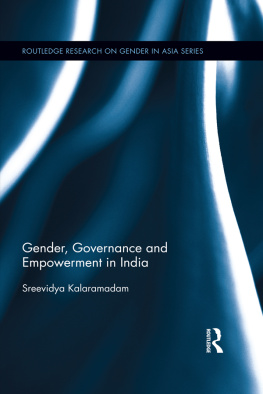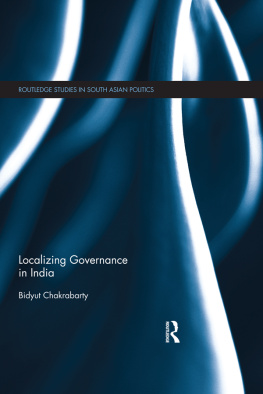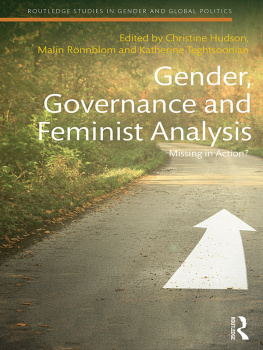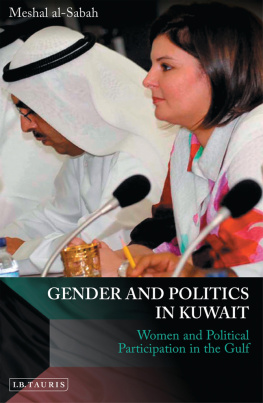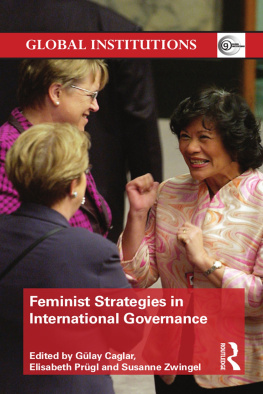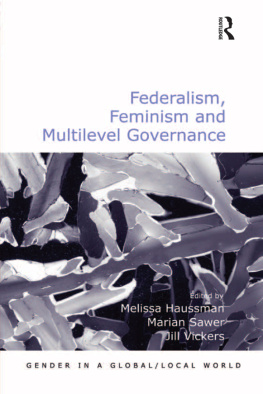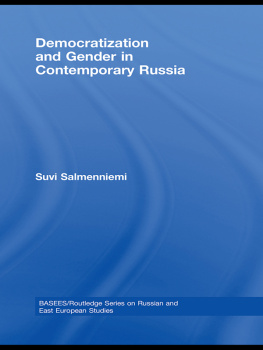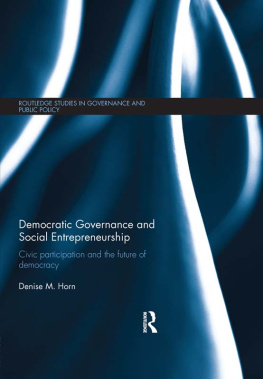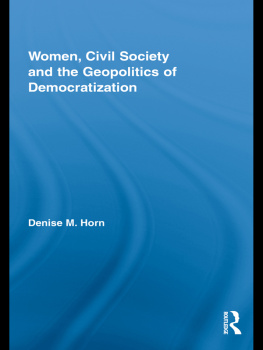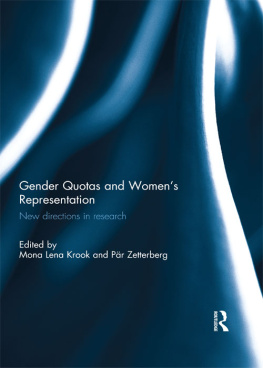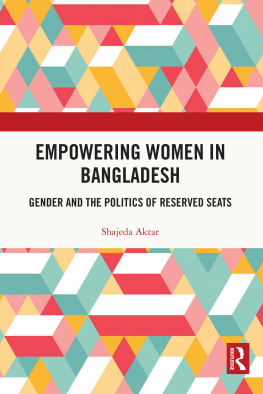Gender, Governance and Empowerment in India
Since the mid-1980s, the presence of women in governance has become a major marker of successful democracy in global and national discourses on the democratization of society. A diverse set of nation-states have legislatively mandated gender quotas to ensure the presence of elected women representatives (EWRs) in various rungs of governance. Since 1993, the Indian state has legislated a massive program of democratization and decentralization. As a result, more than 1.5 million EWRs have taken office within the lower rungs of governance or the Panchayati Raj Institutions (PRI).
This book is an ethnography of the Indian state and its policy of legislated entry of women into political life. It argues that political participation of women is necessary to change the political practices in society, to make institutions more gender, class and caste representative, and to empower individual women to negotiate both formal and informal institutions. Its locus is the everyday life contexts of EWRs in the southern Indian state of Karnataka who negotiate their own meanings of politics, state, society, empowerment and political subjectivity. Analysing three factors structural boundaries, sociocultural divisions and conjunctural limitations imposed on the participation of EWRs by political parties the book demonstrates that the social embeddedness of PRIs within everyday practices and social relations of identity and power severely constrain and shape the political participation and empowerment of EWRs.
Providing a valuable insight into contemporary state and feminist praxis in India, this book will be of interest to scholars of grassroots democracy, gender studies and Asian politics.
Sreevidya Kalaramadam is Assistant Professor in the Department of Womens and Gender Studies at William Paterson University, USA.
Routledge Research on Gender in Asia Series
| 1 | Women, Identity and Indias Call Centre Industry
JK Tina Basi
|
| 2 | Feminist Research Methodology
Making Meanings of Meaning-Making
Maithree Wickramasinghe
|
| 3 | Sex Trafficking in South Asia
Telling Mayas Story
Mary Crawford
|
| 4 | Religion, Gender and Politics in Indonesia
Disputing the Muslim Body
Sonja van Wichelen
|
| 5 | Gender and Family in East Asia
Edited by Siumi Maria Tam, Wai-ching Angela Wong and Danning Wang
|
| 6 | Dalit Womens Education in Modern India
Double Discrimination
Shailaja Paik
|
| 7 | New Modern Chinese Women and Gender Politics
Ya-chen Chen
|
| 8 | Women and the Politics of Representation in Southeast Asia
Engendering Discourse in Singapore and Malaysia
Edited by Adeline Koh and Yu-Mei Balasingamchow
|
| 9 | Women and Conflict in India
Sanghamitra Choudhury
|
| 10 | Gender, Governance and Empowerment in India
Sreevidya Kalaramadam
|
| 11 | Social Transformation in Post-conflict Nepal
A Gender Perspective
Punam Yadav
|
| 12 | Motherhood and Work in Contemporary Japan
Junko Nishimura
|
| 13 | Gender, Violence and the State in Asia
Edited by Amy Barrow and Joy L. Chia
|
| 14 | Intimacy and Reproduction in Contemporary Japan
Genaro Castro-Vzquez |
First published 2016
by Routledge
2 Park Square, Milton Park, Abingdon, Oxon OX14 4RN
and by Routledge
711 Third Avenue, New York, NY 10017
Routledge is an imprint of the Taylor & Francis Group, an informa business
2016 Sreevidya Kalaramadam
The right of Sreevidya Kalaramadam to be identified as author of this work has been asserted by her in accordance with sections 77 and 78 of the Copyright, Designs and Patents Act 1988.
All rights reserved. No part of this book may be reprinted or reproduced or utilised in any form or by any electronic, mechanical, or other means, now known or hereafter invented, including photocopying and recording, or in any information storage or retrieval system, without permission in writing from the publishers.
Trademark notice: Product or corporate names may be trademarks or registered trademarks, and are used only for identification and explanation without intent to infringe.
British Library Cataloguing in Publication Data
A catalogue record for this book is available from the British Library
Library of Congress Cataloging-in-Publication Data
Names: Kalaramadam, Sreevidya, author.
Title: Gender, governance and empowerment in India / Sreevidya
Kalaramadam.
Description: New York, NY : Routledge, 2016. | Series: Routledge
research on gender in Asia series ; 10 | Includes bibliographical
references and index.
Identifiers: LCCN 2015037538 | ISBN 9780415842648 (hardback) |
ISBN 0415842646 (hardback) | ISBN 9781315630373 (ebook) |
ISBN 1315630370 (ebook)
Subjects: LCSH: WomenPolitical activityIndia. | Women legislators
India. | Women local officials and employeesIndia. | Leadership in
womenIndia. | PanchayatIndia. | Political participationIndia.
Classification: LCC HQ1236.5.I4 K355 2016 | DDC 320.082/0954dc23
LC record available at http://lccn.loc.gov/2015037538
ISBN: 978-0-415-84264-8 (hbk)
ISBN: 978-1-315-63037-3 (ebk)
Typeset in Times New Roman
by Apex CoVantage, LLC
Research and writing for this book was supported by the University of Iowa (Gender, Womens and Sexuality Studies Department, T. Anne Cleary dissertation grant, Social Science Dissertation award and South Asian Studies Program) and William Paterson University of New Jersey (Assigned Research Time and HSS summer stipend awards).
To my mentors at the University of Iowa Florence Babb, Meena Khandelwal, Paul Greenough, Priya Kumar and Rosemarie Scullion my deepest gratitude for guiding and shaping this research with your insights and patience; to Ken McDonald, Jael Silliman, Margery Wolf, Melissa Deem, Linda Kerber, Ellen Lewin, Fred Smith and Philip Lutgendorf for the many ways they helped shape my intellectual life at Iowa.
To all the EWRs whose life stories animate this book you made this possible by letting me into your lives, indulging my persistent questions and sharing your time, space, experiences and food; special thanks to my field assistant K. J. Claramma, who accompanied me on many a long journey and assisted me in fieldwork; thanks to V. Geetha (Chennai), Dr. Anand Inbhanathan (ISEC, Banga-lore), Grace Fernandez (Bangalore), the organizations VALORED and Chowki in Mangalore and the Hunger Project, Mahila Samkhya and Vimochana in Banga-lore for sharing their resources, work and time, and to friends at ISST (Bangalore) for sowing the early seeds for my long-term interest in panchayati raj.
To Sangeeta Kamat for enthusiastically reading and commenting on parts of the book; Rupal Oza and Mary Hawksworth for enabling a fulfilling pedagogical experience at Hunter College and Rutgers University; Arlene Scala, Elena Sabogal, Carol Sheffield, Jean Levitan and Donna Perry in the Womens and Gender Studies Department at WPUNJ, and Keumjae Park and Jim Hauser (WPUNJ Writing Group) for their collegiality and support; Ram Mahalingam and Djanna Hill for collaboration and friendship. Thanks to the anonymous readers of the book proposal and sample chapters, and the editors at Routledge for patiently working with me on the long scripting process and accommodating my requests.

